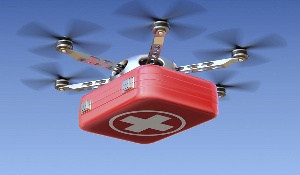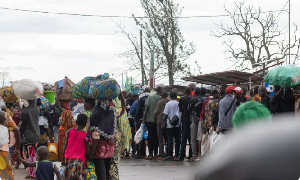hana’s Public Health Sector runs a three-tier system of managing health commodities. The Central Medical Store (CMS), The Regional Medical Store (RMS) and Service Delivery Points (SDPs) in conjunction with the transportation network make up the conduit for the supply chain. The transportation system is made up of a complex network of vehicles, motorbikes and bicycles. Fuel supply to these network of vehicles and motorbikes is a crucial activity to ensure commodity availability at the health facility level.
The CMS takes responsibility for the receipt, storage and distribution of all commodities procured by the Ministry of Health. The RMS and SDPs receive their supplies from CMS through the Pull system. Under commodity distribution framework, an agency may either adopt a push or a pull system of distribution. A push system will require the CMS to distribute commodities to lower levels upon receipt, whether requested or not, whilst the pull or demand system will require the CMS to send logistics based on demand and request from RMS and SDPs.
The Ghana Health Service logistics system is centralized whilst the health care delivery system is decentralized. Logistics management in the health system is crucial and serious business that require smart solutions beyond the rental of drones. This is because there are instances where medicines and health commodities are not available at the Central Medical Stores and the Regional Medical Stores. Consequently, there is no commodity security at the service delivery points. The previous Government under the leadership of President John Dramani Mahama undertook a comprehensive assessment of the logistics management system in order to bring efficiency in the system. The JDM administration studied the practices of logistics management, the causes of inadequacy of logistics and the strengths and weaknesses in Ghana Health Service logistics system.
It was found that poor procurement planning and budgeting, lack of financial resources for procurement, poor quantification and forecasting, delay in procurement process and order processing, and delay in receiving insurance claims are some of the causes of inadequacy of logistics in the health systems. The JDM administration responded to these findings by implementing the Logistic Management Information System which created an I.T. platform with clear business rules that ensured that orders for essential commodities such as blood and blood products as well as anti-snake venom are made three months before stock depletion. This evidence based intervention ensured that no facility will be required to make urgent and request for essential health commodities. It is therefore worrying that the current government has decided to rent drones to transport commodities which will be required by facilities in at least three months’ time. What could have accounted for this if not corruption and lack of knowledge? It appears apparent that the current government does not understand the public sector of the country and feels too proud to consult JDM and/or relevant stakeholders. The Drone rental project should be the last thing Ghanaians should see happen given the fact that it is absolutely unnecessary and insulting to the respected health service workers of this country.
I recommended that Ghana Health Service logistics or supply system must receive constant monitoring and evaluation by the Ghana Medical Association, Civil Society Organisations, the Opposition political parties and the Nurses, Health administrators and Lab Technologists groups.
Further, Stakeholders must ensure that there is effective top-down supervision in the system to guarantee efficiency and prevent operatives of the Government from using the sector as a milking cow to finance their opulence. They should remain at the Dirty oil sector at BOST and other sectors but not at the health sector where a penny stolen has direct consequences on the lives of many Ghanaians. Again, stakeholders must ensure the Drones rental funds are secured from the government and/or GNPC to procure essential health commodities such as Anti-snake venoms, blood and blood products which are currently in short supply at the various medical stores and health facilities. Availability of fuel for the use of vehicles and motorbikes should be prioritized since the shortage of fuel has been blamed for the failure of various stores to deliver essential and regular commodities to facilities. With these basic problems prevalent and remain a major cause of lack of essential commodities at the facility level, how can a person well oriented in time and space decide to rent drones to deal with logistics security in the health sector? The narrow mindedness is beyond redemption indeed.
Stand by for the Gold track of this piece. Thanks for your time.
Dr. Mawia Zakaria.
Executive Director
IRAD
Accra.
Opinions of Friday, 14 December 2018
Columnist: Mawia Zakaria















